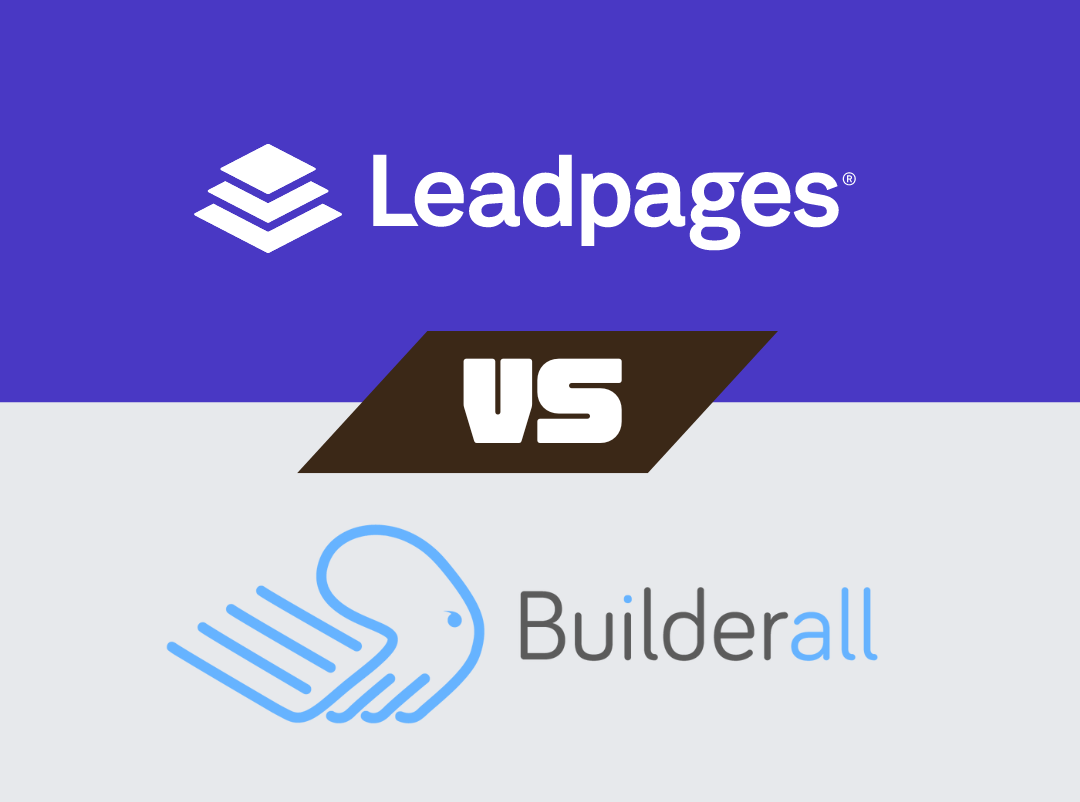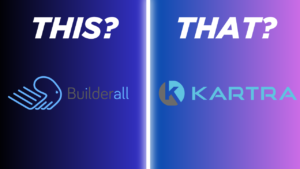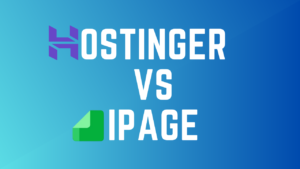Choosing between Leadpages vs Builderall can be challenging, especially when both platforms offer robust tools for digital marketing. In this post, we’ll dive into a detailed comparison, examining key aspects like pricing, ease of use, and sales funnel creation. Whether you’re seeking a simple, high-converting landing page builder or a comprehensive all-in-one marketing solution, this guide will help you determine which platform is the best fit for your business needs. Let’s explore how Leadpages and Builderall stack up against each other.
Table of Contents
Pricing Structure: Comparing Costs
When deciding between Leadpages and Builderall, understanding the pricing structures is key to determining which platform offers the best value for your business.
Leadpages Pricing
Leadpages offers three pricing tiers:
- Standard Plan: $37 per month (billed annually). This plan includes 5 landing pages, unlimited traffic and leads, 1 custom domain, and access to 200+ conversion-optimized templates.
- Pro Plan: $74 per month (billed annually). It offers unlimited landing pages, 3 custom domains, and additional features like selling products and blogging.
- Conversion Plan: $697 per month (billed annually). This is the top-tier plan offering extensive services and tools, ideal for large-scale operations.
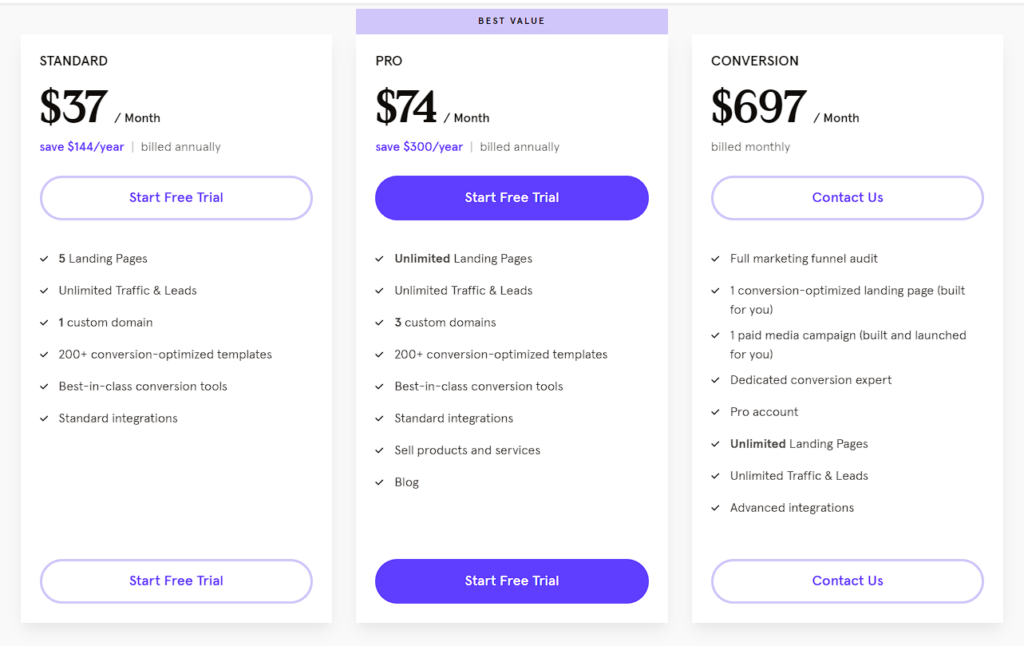
Builderall Pricing
Builderall has four pricing plans:
- Core Plan: $17 per month. Includes 1 published website, 1 domain connection, and basic tools like email marketing and a website builder.
- Essentials Plan: $47 per month. Provides 3 published websites, 3 domain connections, and tools like MailingBoss, booking builder, and WordPress integration.
- Advanced Plan: $97 per month. Includes 5 published websites, 10 Pro mailboxes, and advanced tools such as funnel builder, CRM, and eLearning builder.
- Premium Plan: $247 per month. Offers 10 published websites, video hosting, webinar builder, and access to all available tools.
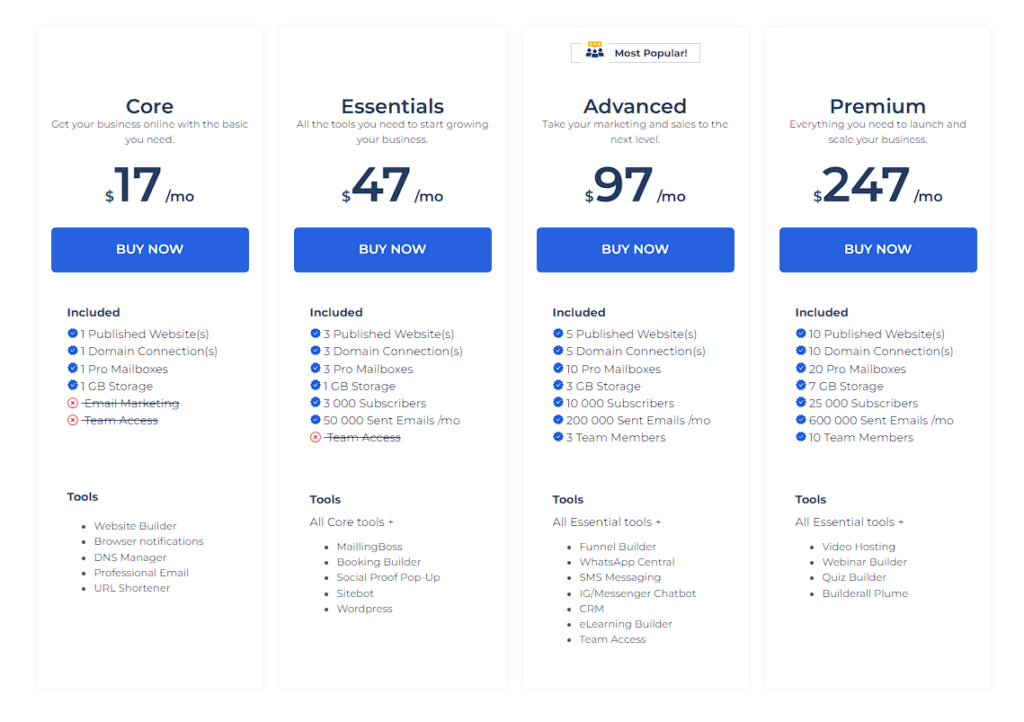
Which Platform Offers Better Value?
Builderall’s pricing is generally more affordable, offering a range of tools at lower price points, which is appealing for small to medium-sized businesses. On the other hand, Leadpages is more focused on providing high-quality landing page creation and optimization tools, justifying its higher price for businesses that prioritize conversions.
For businesses looking to scale, Builderall’s Premium Plan offers extensive tools at a competitive price, while Leadpages provides specialized features that are ideal for conversion-focused marketing.
Ease of Use: Comparing User Experience
When comparing Leadpages and Builderall, ease of use is a crucial consideration, especially for non-technical users.
Leadpages: Ease of Use
Leadpages offers a user-friendly, intuitive interface with a drag-and-drop builder. It’s designed for simplicity, making it easy for users to create landing pages quickly without needing coding skills. The focus on conversion-optimized templates allows users to start with professional designs and make real-time edits easily.
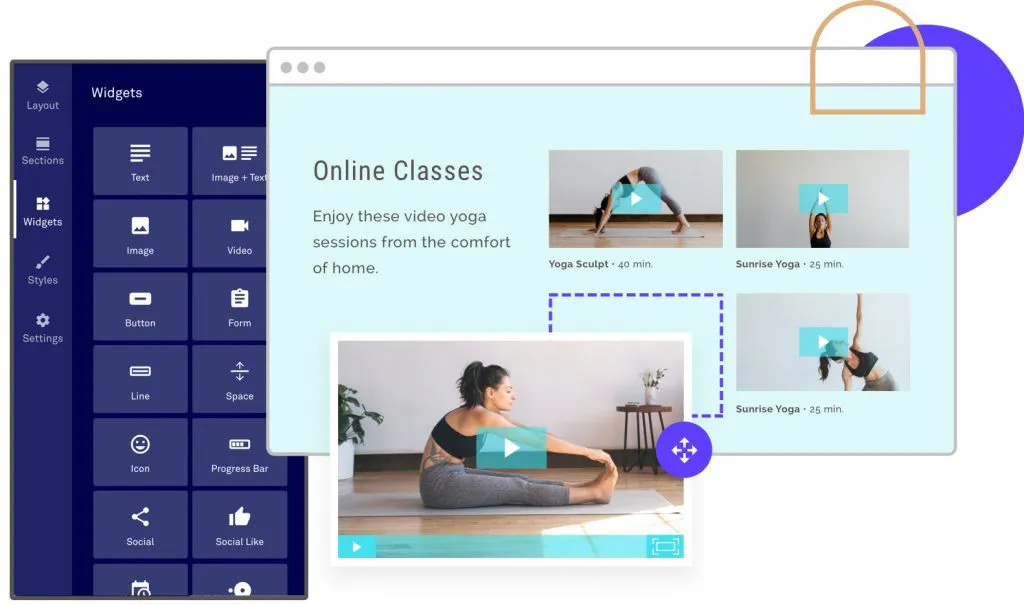
Builderall: Ease of Use
Builderall, while powerful, has a more complex interface. It offers extensive tools, which can be overwhelming for beginners. The drag-and-drop builder is robust but less intuitive, requiring more time to learn.
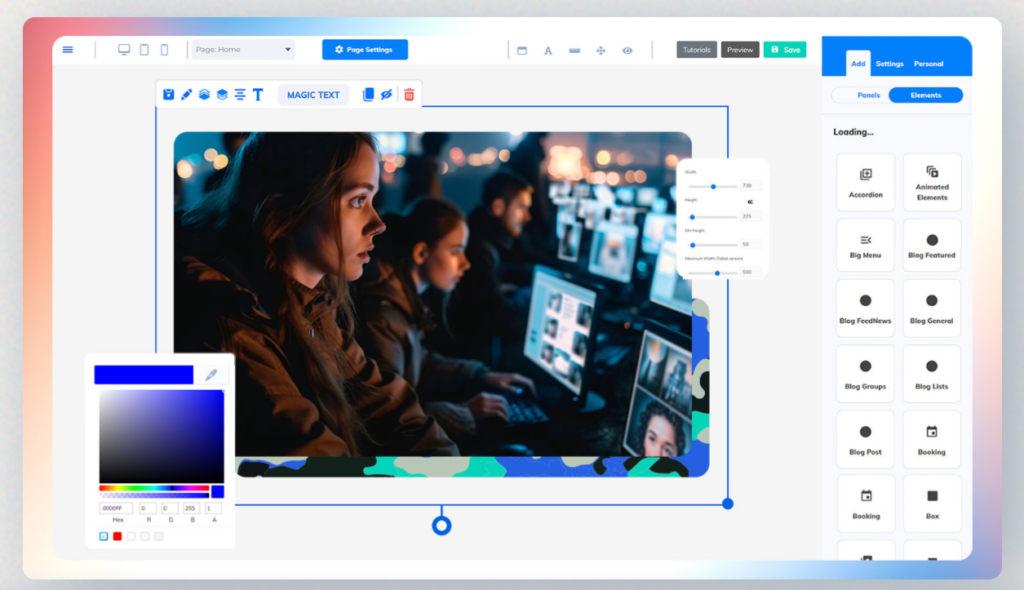
Which Platform is Easier to Use?
In terms of ease of use, Leadpages clearly has the edge for users who prioritize simplicity and speed. Its straightforward, no-nonsense approach makes it ideal for those who want to create effective landing pages without getting bogged down by too many options. Builderall, on the other hand, is better suited for users who are willing to spend more time learning the platform in exchange for access to a wider array of tools.
For businesses or individuals looking for quick setup and ease of use, Leadpages is the better option. However, if you require more advanced features and are comfortable with a more complex interface, Builderall might be the right choice.
Landing Page Builder: Customization and Templates
When comparing Leadpages and Builderall, the quality and flexibility of their landing page builders are essential factors to consider. Both platforms offer powerful tools, but they differ in customization options and template availability.
Leadpages: Customization and Templates
Leadpages excels in providing a streamlined, user-friendly landing page builder. The platform offers over 200+ professionally designed, conversion-optimized templates. These templates are easy to customize using the drag-and-drop editor, which allows users to modify layouts, add elements, and integrate third-party tools without needing any coding skills. Leadpages focuses on simplicity while ensuring that the customization process remains powerful enough to meet most business needs.

Builderall: Customization and Templates
Builderall offers a more extensive range of customization options but with a steeper learning curve. The platform provides numerous templates, but the interface is less intuitive than Leadpages. While Builderall’s templates cover a wide array of industries and use cases, the customization process can be more involved. Users can take advantage of advanced editing options to create highly tailored landing pages, but it may require more time to achieve the desired results.

Conclusion
Leadpages is ideal for users who want a straightforward, efficient way to create high-converting landing pages with minimal hassle. Builderall, on the other hand, is better suited for those who need more in-depth customization options and are willing to spend extra time learning the platform.
Sales Funnel Creation: Building Effective Funnels
Creating effective sales funnels is crucial for converting leads into customers, and both Leadpages and Builderall offer robust tools to help you achieve this. However, the approach and ease of use can vary significantly between the two platforms.
Leadpages: Sales Funnel Creation
Leadpages focuses primarily on landing page creation, but it also offers basic funnel-building capabilities. Users can create simple sales funnels by linking multiple landing pages, pop-ups, and alert bars. While Leadpages is highly effective for lead generation, it lacks the more complex funnel-building tools found in other platforms. However, its simplicity and integration with third-party tools like email marketing platforms make it a solid choice for straightforward funnel creation.

Builderall: Sales Funnel Creation
Builderall stands out for its comprehensive sales funnel creation tools. It provides a dedicated funnel builder that allows users to design and manage complex funnels, from lead capture to sales and beyond. Builderall offers a variety of pre-built funnel templates, making it easier for users to set up intricate funnels tailored to specific marketing goals. Additionally, Builderall’s funnels can incorporate various elements such as email sequences, webinars, and membership areas, providing a more all-encompassing solution for businesses looking to maximize their sales processes.

Conclusion
Leadpages is excellent for users seeking a simple, effective way to create basic sales funnels, particularly for lead generation. Builderall, with its more advanced and versatile funnel-building capabilities, is ideal for businesses needing detailed, multi-step sales processes integrated with a wide range of marketing tools.
Integrations: Third-Party App Compatibility
The ability to integrate with third-party apps is crucial for expanding your platform’s functionality, and both Leadpages and Builderall offer integration options, though they differ in scope and ease.
Leadpages: Third-Party App Compatibility
Leadpages integrates seamlessly with a wide range of popular third-party apps, including CRM systems, email marketing tools, and social media platforms. This ease of integration makes it simple to connect Leadpages with tools like Mailchimp, HubSpot, and WordPress, enhancing your marketing efforts without complicated setups.

Builderall: Third-Party App Compatibility
Builderall also supports integrations with various third-party apps, though it offers more native tools built directly into the platform. While it connects with external apps like Stripe for payments or WebinarJam for webinars, Builderall’s ecosystem is more self-contained, which can be beneficial for users looking for an all-in-one solution.

Conclusion
Leadpages excels in easy, seamless integrations with a broad array of third-party apps, making it ideal for users who rely on specific tools. Builderall, with its built-in tools and selective integrations, suits users looking for a more integrated, all-in-one platform.
Email Marketing Capabilities: Features and Flexibility
When evaluating Leadpages and Builderall, their email marketing capabilities play a crucial role in determining which platform best suits your needs.
Leadpages: Email Marketing Capabilities
Leadpages focuses on lead generation but doesn’t offer built-in email marketing tools. Instead, it integrates seamlessly with popular email marketing platforms like Mailchimp, ActiveCampaign, and others. This approach provides flexibility, allowing you to choose the email service that best fits your needs.
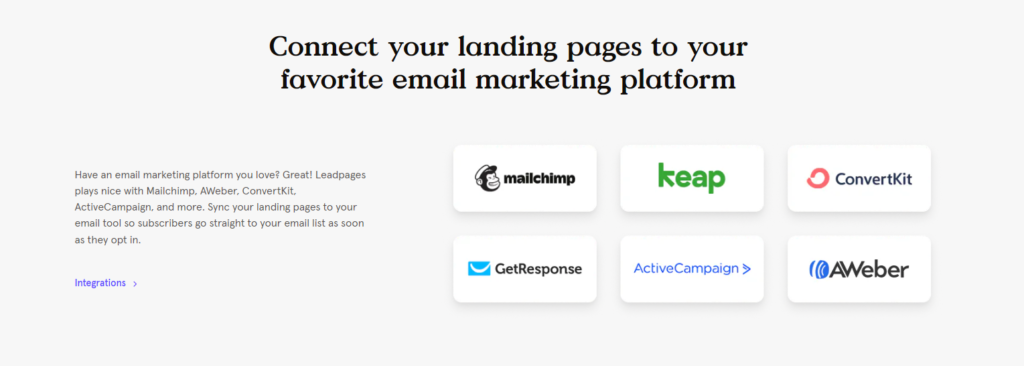
Builderall: Email Marketing Capabilities
Builderall includes a robust built-in email marketing system called MailingBoss. This tool allows users to create, manage, and automate email campaigns directly within the platform. With features like list segmentation, automation workflows, and detailed analytics, Builderall offers a comprehensive solution for businesses that want an all-in-one platform.
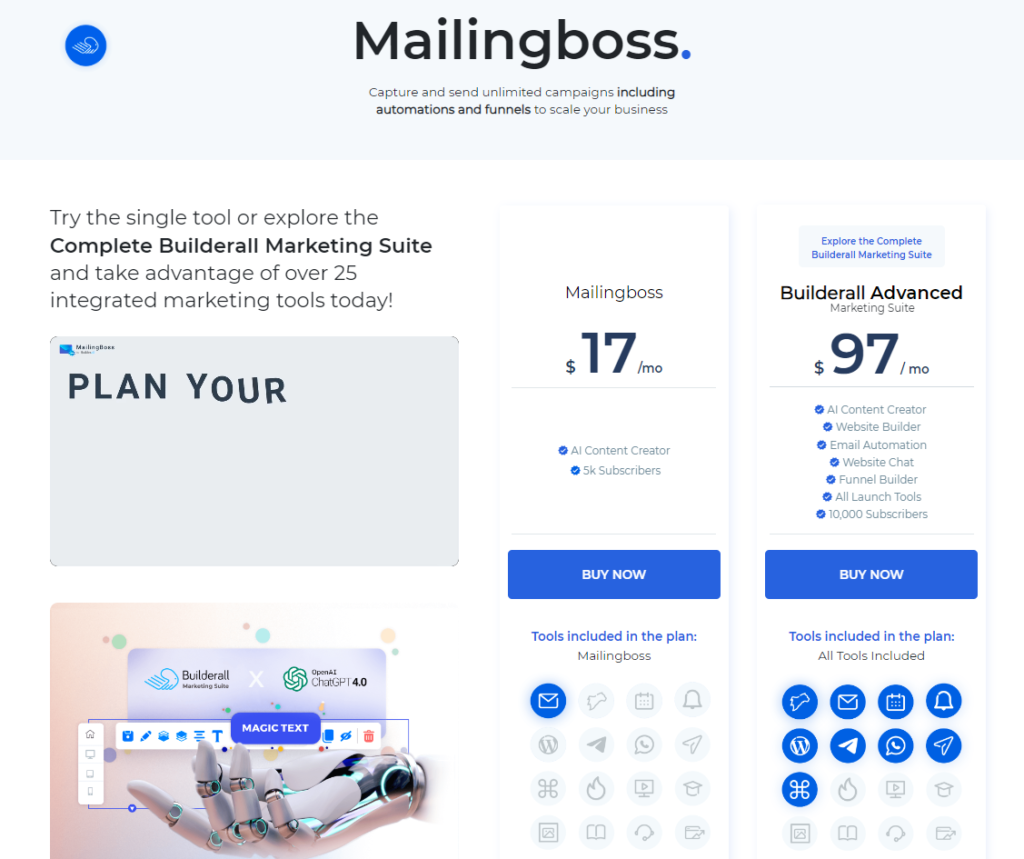
Conclusion
Leadpages excels in flexibility by integrating with various third-party email services, making it ideal for users who already have a preferred email tool. Builderall, with its built-in MailingBoss, offers a more integrated approach, perfect for those looking for an all-inclusive platform.
E-commerce Features: Selling Online
When it comes to selling products online, both Leadpages and Builderall offer distinct e-commerce capabilities.
Leadpages: E-commerce Features
Leadpages primarily focuses on landing pages but offers basic e-commerce features through integrations. Users can set up sales pages and connect with third-party tools like Stripe or PayPal to handle transactions. While it’s not a full-fledged e-commerce platform, it’s sufficient for selling single products or services.

Builderall: E-commerce Features
Builderall provides more robust e-commerce features, including a complete online store builder. It allows users to create and manage an entire online shop, with tools for managing products, handling payments, and automating sales processes. Builderall also supports upsells, downsells, and checkout customization, making it a more comprehensive solution for online sellers.
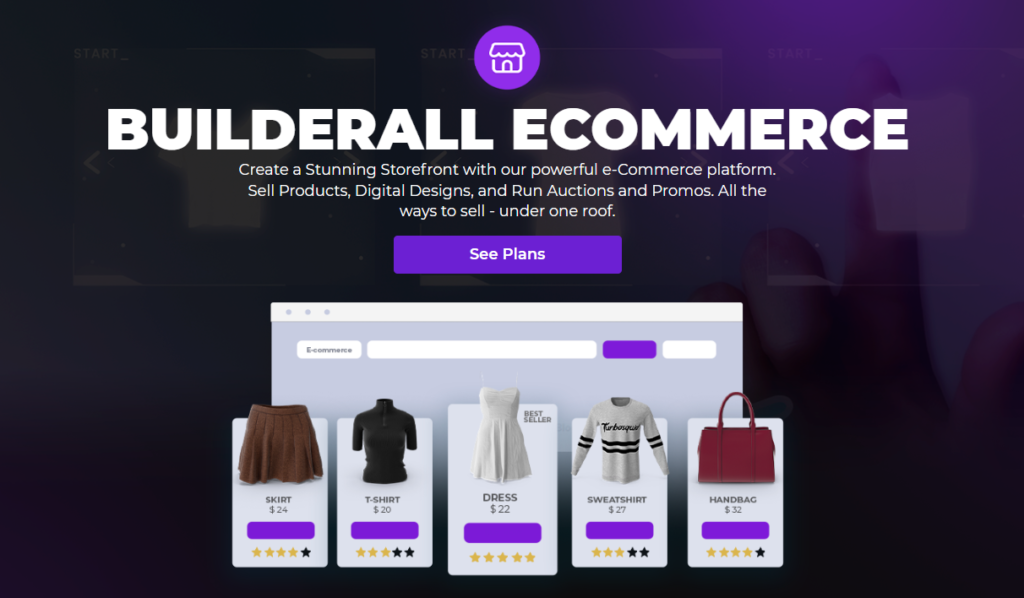
Conclusion
Leadpages is ideal for simple sales setups with its easy integrations, while Builderall is better suited for businesses looking to build and manage a full online store.
SEO and Analytics: Tracking and Optimization
Effective SEO and analytics are crucial for improving your online presence and understanding your audience. Both Leadpages and Builderall offer tools to help you track and optimize your website’s performance.
Leadpages: SEO and Analytics
Leadpages provides built-in SEO settings, allowing you to customize meta tags, descriptions, and keywords for your landing pages. It integrates smoothly with Google Analytics, enabling you to track user behavior and conversion rates. Additionally, Leadpages offers easy-to-use analytics dashboards to monitor your page performance.
Builderall: SEO and Analytics
Builderall includes more advanced SEO tools, such as an SEO report tool that helps optimize your pages based on specific keywords. It also integrates with Google Analytics and offers in-depth tracking features, including heat maps and visitor statistics, to help you understand user interactions on your site.
Conclusion
Leadpages offers straightforward SEO settings and essential analytics, making it ideal for users who need basic tracking and optimization. Builderall, with its advanced SEO tools and detailed analytics, is better suited for those who want deeper insights and more control over their SEO strategy.
Page Load Speed and Performance: Which is Faster?
Page load speed is a critical factor in user experience and SEO. Both Leadpages and Builderall offer tools designed to optimize performance, but there are differences in how they handle page load times.
Leadpages: Page Load Speed
Leadpages is known for its fast-loading pages, optimized for speed and performance. The platform uses lightweight code and efficient servers to ensure that landing pages load quickly, which is essential for reducing bounce rates and improving conversions.

Builderall: Page Load Speed
Builderall offers a comprehensive platform with many built-in tools, which can sometimes lead to slightly slower page load times compared to Leadpages. However, Builderall provides options to optimize load times, such as using its CDN (Content Delivery Network) and compressing images.

Conclusion
Leadpages generally provides faster page load times, making it ideal for users who prioritize speed and simplicity. Builderall, while offering more features, may require additional optimization efforts to match Leadpages’ performance.
Customer Support: Help and Resources
Quality customer support is vital when choosing between Leadpages and Builderall. Both platforms offer various support options, but they differ in availability and depth of resources.
Leadpages: Customer Support
Leadpages provides multiple support channels, including live chat, email, and a comprehensive knowledge base. The platform also offers weekly webinars and an active community forum where users can get help and share tips. For Pro and Advanced plan users, priority support is available, ensuring faster response times.
Builderall: Customer Support
Builderall offers support through email, a ticketing system, and live chat. Additionally, Builderall provides extensive video tutorials, a knowledge base, and a user community for peer support. While the support is generally responsive, some users may find the response times slower than desired, especially during peak times.
Conclusion
Leadpages offers more comprehensive and accessible support options, particularly for users on higher-tier plans. Builderall provides solid support but may require more patience with response times.
Final Verdict: Which Platform is Right for You?
Choosing between Leadpages and Builderall ultimately comes down to what you value most in a digital marketing platform. Both have their strengths, but they cater to slightly different needs.
Leadpages is an excellent choice if you prioritize ease of use, quick setup, and fast page load speeds. It’s particularly well-suited for businesses focused on lead generation and conversion optimization. The platform’s strong integration capabilities allow you to connect seamlessly with the tools you already use, making it easy to build and deploy landing pages that drive results. The straightforward interface means that even those with minimal technical expertise can create professional, high-converting pages in no time. Additionally, Leadpages offers robust customer support, including live chat and priority support for higher-tier plans, ensuring that help is available when you need it most.
On the other hand, Builderall is a more comprehensive, all-in-one digital marketing suite that includes not only landing page creation but also advanced sales funnel tools, email marketing, e-commerce capabilities, and more. This makes it an attractive option for businesses that want a wide range of tools in a single platform. Builderall’s sales funnel builder is particularly powerful, allowing you to create complex, multi-step funnels that can drive significant business growth. The platform’s built-in tools, such as MailingBoss for email marketing and an e-commerce store builder, offer a level of integration that Leadpages doesn’t match. However, Builderall does come with a steeper learning curve, which means that it might take longer to fully harness all of its capabilities.
In terms of pricing, Builderall tends to offer more features at a lower price point, making it a cost-effective solution for businesses looking to scale quickly without needing to invest in multiple tools. Leadpages, while slightly more expensive, justifies its pricing with its focus on ease of use, faster page load times, and specialized landing page optimization features.
If your primary goal is to create and optimize landing pages with minimal fuss, Leadpages is the way to go. However, if you’re looking for an all-in-one platform that can handle everything from website building to advanced sales funnels and email marketing, Builderall is the better choice.
In summary, Leadpages is ideal for those who need a simple, effective tool for landing pages and lead generation, while Builderall is best for users who want a comprehensive suite of digital marketing tools and are willing to invest time in mastering a more complex platform. Your final decision should be guided by the specific needs and goals of your business.


